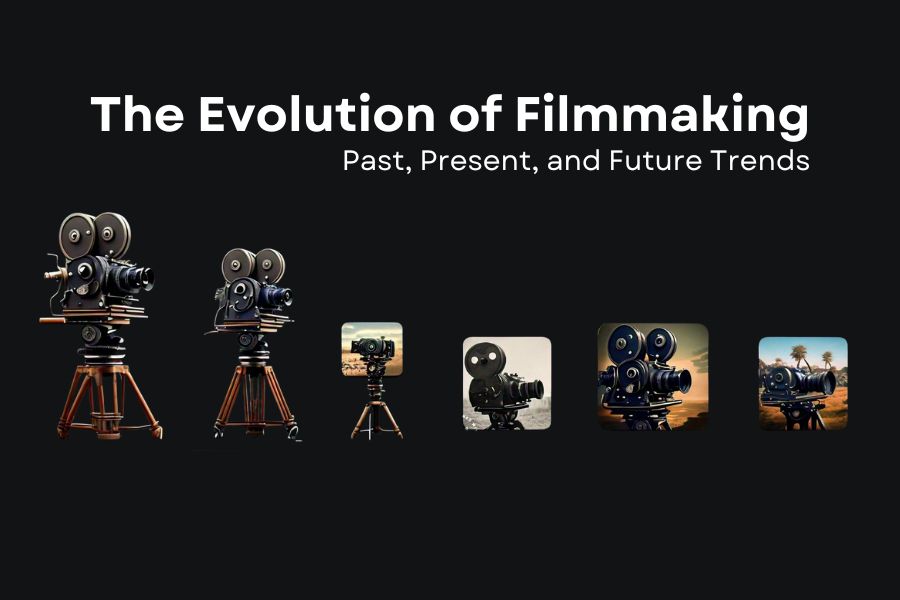Table of Contents
Introduction
The filmmaking industry in 2024 is a vibrant and ever-evolving realm teeming with opportunities for aspiring filmmakers. With the advent of new technologies and platforms, the doors to creativity and storytelling have swung wide open. But how do you navigate this complex and competitive world? This guide aims to provide you with a comprehensive roadmap on how to start a career in filmmaking, filmmaking career guide, breaking into the film industry, film industry jobs, skills, and strategies.
Understanding the Film Industry
The Evolution of the Film Industry

The entertainment world has made some amazing progress from its unassuming starting points. From silent films to the era of CGI and streaming services, the evolution has been nothing short of revolutionary. In 2024, the industry is marked by a fusion of traditional cinema and digital innovation, creating a hybrid environment where old meets new.
Silent Films (Late 1800s – 1920s): Early films relied on visual storytelling and music scores to convey emotions. Think Charlie Chaplin’s iconic movies like “Modern Times” (1936).
Sound Era (1920s – Present): The introduction of sound in films, pioneered by “The Jazz Singer” (1927), revolutionized the industry, allowing for spoken dialogue and a more immersive experience.
Golden Age of Hollywood (1930s – 1950s): Studio systems dominated, producing classic films and creating movie stars. “The Wizard of Oz” (1939) and “Casablanca” (1942) are great examples.
Television and Home Video (1950s – Present): Television emerged as a competitor, then home video (VHS, DVD) changed distribution.
CGI and Digital Era (1990s – Present): Computer-generated imagery (CGI) revolutionized special effects, seen in films like “Jurassic Park” (1993). Streaming services like Netflix and Disney+ are now major players.
Key Sectors Within the Industry
The film industry is vast and encompasses several key sectors, including production, distribution, exhibition, and marketing. Each sector offers unique opportunities and challenges, and understanding them is crucial for anyone looking to enter the field.
Production: Creates the film, including scriptwriting, filming, editing, and special effects.
Distribution: Delivers the film to theaters, streaming platforms, or other outlets.
Exhibition: Theaters and platforms where audiences view the film.
Marketing: Promotes the film to generate interest and ticket sales.
Current Trends and Opportunities
Current trends in filmmaking include the rise of indie films, the growing importance of streaming platforms, and the increasing use of virtual reality (VR) and augmented reality (AR) in storytelling. These trends are opening up new avenues for creativity and employment, making it an exciting time to join the industry.
Rise of Indie Films: Independent productions gain popularity with streaming platforms offering distribution options outside the traditional studio system. “Parasite” (2019) is a recent award-winning indie success.
Streaming Platforms: Netflix, Hulu, Amazon Prime are major players in film production and distribution, creating new opportunities for filmmakers.
VR and AR: Virtual and Augmented Reality are being explored for immersive storytelling experiences.
Preparing Filmmaking Career Guide
Self-Assessment and Passion
Before diving into the filmmaking world, it’s essential to conduct a self-assessment. Are you passionate about storytelling? Do you have the resilience to face the industry’s ups and downs? Your answers to these questions will help you determine if a career in filmmaking is right for you.
Educational Pathways
While a formal education isn’t strictly necessary, it can be incredibly beneficial. Film schools offer structured learning, access to equipment, and networking opportunities. Many successful filmmakers have graduated from renowned institutions like the American Film Institute or New York University’s Tisch School of the Arts.
Skills Required for Filmmakers
Successful filmmakers possess a blend of technical skills and creative prowess. Key skills include:
- Storytelling: The capacity to create convincing accounts.
- Technical Proficiency: Understanding of camera work, lighting, and sound.
- Project Management: Ability to oversee a project from conception to completion.
- Collaboration: Working effectively with a diverse team.
Gaining Experience
Internships and Entry-Level film industry Jobs
One of the best ways to gain experience is through internships and entry-level jobs. These positions provide hands-on learning and a glimpse into the workings of the industry. Look for opportunities at production companies, studios, or even with independent filmmakers.
Networking and Mentorship
Networking is invaluable in the film industry. Go to film celebrations, studios, and industry occasions to meet experts and friends. Finding a mentor can also provide guidance and open doors to new opportunities.
Building a Portfolio
A strong portfolio showcases your skills and creativity. Include short films, spec scripts, or any relevant work that highlights your abilities. A well-crafted portfolio can set you apart from the competition and attract potential employers.
Exploring Different Filmmaking Roles
Director
Directors are the visionaries who bring stories to life. They oversee the creative aspects of a film, from script to screen, ensuring the final product aligns with their artistic vision.
Producer
Producers manage the business side of filmmaking. They handle financing, scheduling, and logistics, ensuring the project stays on track and within budget.
Screenwriter
Screenwriters are the architects of the story. They create the script, develop characters, and write dialogue, forming the blueprint for the entire film.
Cinematographer
Cinematographers, or directors of photography (DPs), are responsible for the visual elements of a film. They work closely with the director to achieve the desired look and feel through camera work, lighting, and shot composition.
Editor
Editors piece together the raw footage, crafting the final narrative. They work with the director to refine the story, ensuring the pacing and continuity are seamless.
Breaking into the Film Industry

How to Start a Career in Filmmaking
Starting a career in filmmaking requires a combination of education, experience, and networking. Begin by gaining foundational knowledge through courses or self-study, then seek out internships and entry-level positions to build your resume.
Filmmaking Career Guide
A comprehensive filmmaking career guide can provide step-by-step instructions on entering the industry. Resources such as IMDb Pro and Film Independent offer valuable insights and tools for aspiring filmmakers.
Tips for Standing Out
To stand out in the competitive film industry, focus on:
- Creating Unique Content: Develop a distinct voice and style.
- Continuous Learning: Remain refreshed with industry patterns and advances.
- Networking: Build relationships with industry professionals.
Utilizing Social Media and Online Platforms
Social media and online platforms like YouTube and Vimeo are powerful tools for showcasing your work. Use these platforms to share your films, connect with other filmmakers, and gain visibility.
Conclusion
Breaking into the film industry is no small feat, but with passion, dedication, and the right strategies, it’s entirely possible. This guide has outlined the key steps and considerations for starting a career in filmmaking in 2024. Remember, every filmmaker’s journey is unique, so embrace your path and keep pushing forward.
FAQs
What is the best way to start a career in filmmaking?
The best way to start a career in filmmaking is to gain foundational knowledge through education, seek internships or entry-level positions, build a strong portfolio, and network with industry professionals.
Do I need a degree to work in the film industry?
While a degree is not mandatory, it can provide valuable skills, knowledge, and networking opportunities. Many successful filmmakers have pursued formal education, but there are also numerous self-taught professionals in the industry.
How can I find a mentor in filmmaking?
Finding a mentor can be achieved through networking at film festivals, industry events, and online communities. Reach out to professionals whose work you admire and express your interest in learning from them.
What are the most in-demand jobs in the film industry?
In-demand jobs in the film industry include roles such as director, producer, screenwriter, cinematographer, and editor. Technical positions related to digital effects and post-production are also highly sought after.
How important is networking in the film industry?
Networking is crucial in the film industry. Building relationships with peers and professionals can lead to job opportunities, collaborations, and valuable mentorship.

